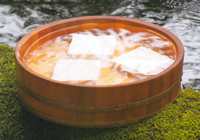| |
|
FOOD
|
|
JAPANESE FOOD FAIR
|
| Date |
Venue |
Organizer (Contact) |
Entry |
| January 30, 31 |
Japanese Ambassador’s Residence,
New Delhi |
Embassy of Japan, Japan Foundation, and
Ume-no-Hana Co. Ltd.
(Emb: 24122970) |
Invitation |
|
|

tofu and yuba
Japanese Delicacies
Buddhist vegetarian cuisine is known as shojin ryori, and was brought to Japan by the monks who introduced Buddhism, originally from India, via China and Korea, in the sixth century. Shojin ryori spread considerably in the thirteenth century, with the arrival of Zen. Vegetarianism in Japan is almost completely an aspect of Zen Buddhism, which seems to observe the Buddhist strictures against eating fish, fowl, or flesh, more strictly than other groups. The most obvious feature is the use of soybean products instead of fish and meat.
It is not easy to select a completely vegetarian meal at an ordinary Japanese restaurant. But some times in the shadow of Zen temples, non-temple vegetarian restaurants provide the same kind of food.
Restaurant Ume no Hana specializes in cuisine made from tofu (soybean curd) and yuba (soy milk skin). For the occasion, Ume no Hana will present tofu and yuba dishes cooked in different ways, along with some non-veg. dishes, with traditional tableware and utensils, for the pleasure of its guests.
Since Ume-no-Hana’s headquarter is located in Kyushu district, most of tableware brought are Arita-yaki porcelain from Arita-town in Kyushu.
The Japanese porcelain was first made in this Arita Town in early 17th century. From 1659, the Arita Yaki porcelain was exported to Europe through Dutch East Indian Company and got very popular in Europe. The Arita Yaki has been keeping the top brand status of Japanese porcelain even today.
For this Food Festival, Japanese Ministry of Agriculture has sent some freshest vegetables to promote “Try Good Japanese Food” campaign which aims at spreading Japanese Food of Good Quality around the world.

|
|
|
|
|
|
|
|
|
| |
|
|
|
|
|